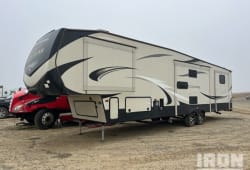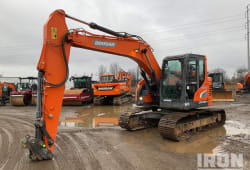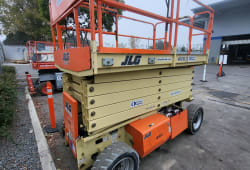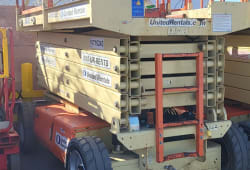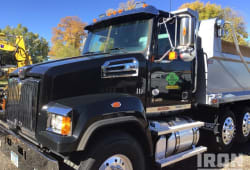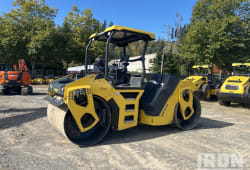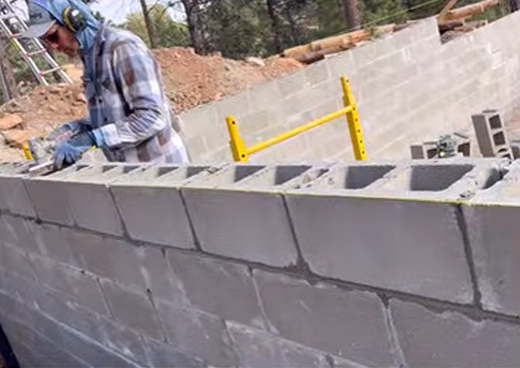Between Buying vs. Renting Heavy Equipment
9 Min read
)
November 1, 2022
If you're ready to expand your fleet and take on new heavy equipment, replace your current fleet management and equipment, or take on big projects, you're likely wondering about the differences between buying vs. renting heavy equipment.
Evaluating the pros and cons of both buying and renting and your current financial capabilities will be the key to making the best decision for your business. Although the upfront cost may seem to be the only major factor, there are several others to consider when making your decision. Let's look at some of the most important factors to keep in mind while weighing out your options and deciding whether to rent or buy your equipment.
Your Financial Capabilities
The first order of business is to determine whether or not you currently have the capital to purchase a piece of equipment. However, it's important to consider your financial situation in the coming months or years before making a decision. While purchasing your equipment may cost you a lump sum all at once, the cost of just renting construction equipment will eventually add up. It could cost more overall, particularly if you don't plan to use the equipment for the entire rental period.
On the other hand, purchasing equipment offers the added benefit of getting a return on your investment when you are ready to sell it. There are a couple of ways to reduce the financial burden of purchasing a piece of equipment:
Financing
Rather than putting a large amount of cash as down payment on a new piece of equipment, you can give yourself more breathing room by financing your equipment so you can keep your capital and avoid putting yourself in a tight position. If you can get low rates, your monthly payments may be even lower than a rental payment.
Purchase Used Equipment
When renting equipment, you are typically paying higher rates for the latest and greatest equipment. While this could make sense if you only need the new equipment for the short term, chances are that purchasing used equipment from a trusted marketplace such as Boom & Bucket is the best financial decision. Buying high-quality and well-maintained used equipment is not only more cost-effective, but it also helps you avoid the current supply chain issues. Additionally, buying used equipment is often cheaper than renting in the long run.
Cost of Ownership vs. Cost of Renting
When deciding, you'll want to estimate the cost difference between renting and buying equipment. Owning equipment comes with maintenance and operating costs, insurance, government licensing, and other fees. The total cost will vary depending on the machine. However, considering rental cost, this is a crucial step in the budgeting process.
Renting is often an all-inclusive cost; however, you should also plan to pay some sort of rental fee for specialty equipment. You may also want to prepare to pay to have the equipment transported.
Whether you buy or rent your heavy equipment, buy or rent it, fuel will be an additional cost to take into consideration. Approximately one-third of your total expenses will go toward fuel, so be sure to include that in your budget.
Anticipated Usage
One of the most important factors to consider is the anticipated usage of the machine you are interested in acquiring. The length of the project or the frequency of the jobs it will be used on will play a major role in whether renting or buying construction equipment is the most appropriate option for your business. If you only need a piece of equipment for a short time or a one-off project, chances are that renting will make more sense. However, if you don't plan to use the machine for the entire rental period or if you experience unexpected delays, you could end up paying money for a machine that is sitting idle and not earning any money.
For longer or more frequent projects, buying a piece of equipment is the best financial decision, as rental costs will add up over time.
Equipment Availability
Owning your equipment means that it is available for you to use 24/7. This convenience will come in handy in the event of sudden or unexpected changes in schedules or project requirements and will help you avoid downtime by allowing you to take on more jobs with little notice.
Additionally, owning your equipment helps you avoid the risks that come along with being at the mercy of a used rental equipment or company. If they don't have the equipment you need when you need it, it could cost you work and money.
Owning your equipment will also bring more peace of mind to your clients. They'll know that you are fully equipped to handle their project and that you have a stable and trustworthy business.
Equipment Management
Another consideration to keep in mind is managing your equipment. You can save time and money by purchasing your equipment and managing the insurance, maintenance, and other fees yourself. If you don't have the time or skills to do so, it may be worth your while to pay a slightly higher price to rent equipment.
There are many factors to consider when deciding whether to rent construction equipment or buy your equipment. Renting equipment makes more sense for short-term jobs while buying offers more stability and flexibility long term. Utilizing a marketplace such as Boom & Bucket will help you browse high-quality equipment at great rates and help take the guesswork out of purchasing heavy equipment.
Evaluating the Long-Term Benefits
Heavy equipment buy or rent can be seen as an investment. Despite the higher initial outlay, the machinery eventually becomes a tangible asset that retains some value over time. When you're ready to upgrade or diversify, selling used equipment can yield returns, helping offset the costs of new acquisitions. Additionally, ownership provides stability, allowing for greater control over the assets and reducing dependence on external factors such as rental availability.
Renting, on the other hand, offers flexibility, especially for short-term or specialized projects. It negates concerns about equipment maintenance, depreciation, or obsolescence. This flexibility might be advantageous for companies that prefer not to be tied down to specific machinery, especially when the technological landscape in heavy equipment is rapidly evolving.
Mitigating Risks and Maximising Flexibility
Risk mitigation is a critical element in this decision-making process. When you own your equipment, you're in control. You're not subject to the risks associated with rented equipment, like unexpected surcharges, sudden equipment rental or terminations, or subpar machinery conditions. This autonomy can be a substantial advantage in the long run.
Flexibility plays a crucial role in adapting to market fluctuations. Owning equipment may provide stability, but it might also lock you into specific types of machinery. Renting allows for adaptability to changes in project requirements, seasonal demands, or technological advancements.
Industry-Specific Considerations
The decision to buy or rent heavy equipment can be industry-specific. For instance, construction equipment companies might prefer owning more commonly used machinery for long-term projects, ensuring they're always equipped to take on various jobs. However, they might choose to rent specialized or less frequently used equipment to avoid the costs associated with owning and maintaining such machinery.
In contrast, event management companies or businesses dealing with periodic large-scale projects might find renting a more cost-effective and flexible option. They can acquire specialized construction equipment rental as needed, avoiding the maintenance costs when the equipment isn't in use.
Balancing Factors to Make an Informed Decision
Ultimately, it's about balancing different factors – financial considerations, anticipated usage, business needs, and market demands – to make an informed decision. Both options have their merits, and the ideal solution might lie in a hybrid model: owning the core, frequently used machinery and renting supplementary or construction equipment.
The Role of Technology and Innovation
The landscape of heavy equipment is evolving rapidly, with technology integration, eco-friendly machinery, and automation shaping the construction industry. This paradigm shift may tilt the balance toward renting in some cases, ensuring access to the latest, most advanced equipment without committing to long-term ownership of swiftly outdated technology.
Factors Beyond Cost: Client Perception and Reliability
Perception in the eyes of your clients and stakeholders is essential. Owning your equipment can symbolize stability and reliability. Clients often have more confidence in businesses that have their own machinery, perceiving them as more capable and committed to the job at hand.
Moreover, owning your equipment could potentially give you an edge in negotiations, as clients may value the convenience and assured availability. This trust and confidence in your equipment ownership can be a significant differentiator in a competitive market.
Exploring Solutions with Boom & Bucket
The decision to buy or rent heavy equipment isn't a one-size-fits-all scenario. It's a strategic choice that necessitates a comprehensive understanding of your business needs, financial capacity, operational requirements, and industry trends. Both options have their strengths and weaknesses, and the optimal choice hinges on your specific context and goals.
Marketplaces such as Boom & Bucket offer a diversified inventory of high-quality equipment, simplifying the process of equipment acquisition. They provide an avenue rental companies to explore various options, empowering businesses to make well-informed decisions tailored to their specific requirements.
Here's a table comparing buying vs. renting heavy equipment:
:format(webp)) This table highlights the key differences between buying and renting heavy equipment, covering aspects such as cost, flexibility, management, risk, technology, and client perception. It provides a comprehensive overview to aid in decision-making for businesses considering their equipment acquisition options.
This table highlights the key differences between buying and renting heavy equipment, covering aspects such as cost, flexibility, management, risk, technology, and client perception. It provides a comprehensive overview to aid in decision-making for businesses considering their equipment acquisition options.

